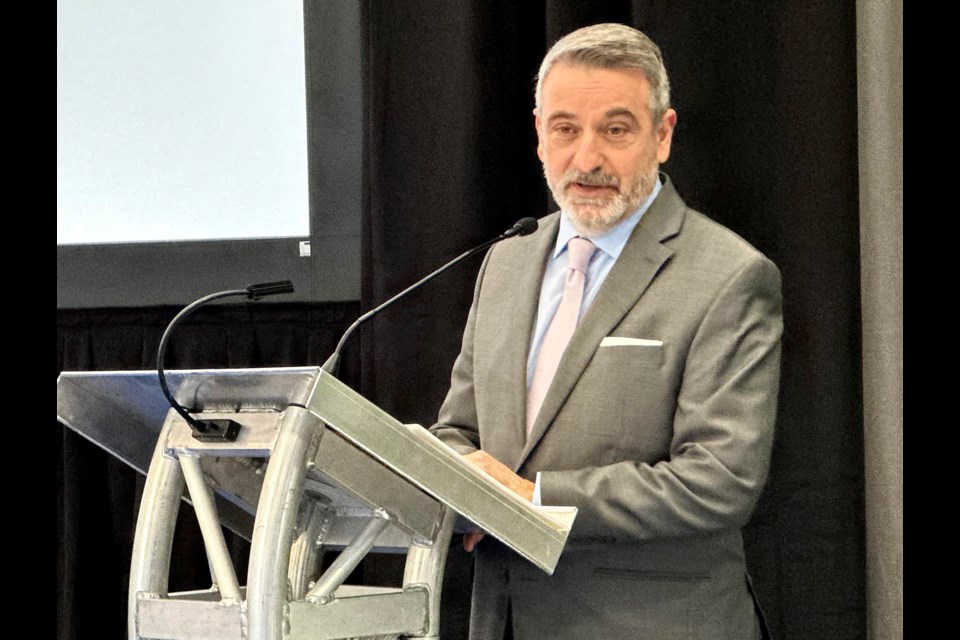A version of this story was first published by OrilliaMatters, a Village Media publication.
Ontario politicians traded barbs at a conference for small municipalities in Orillia Friday.
“It is shameful that the Ford government is about to turn down — Minister (Paul) Calandra, I'm looking at you — $357 million in federal funding alone for affordable and social housing because you've not met your targets," said Ontario Liberal Party leader Bonnie Crombie in her address to the Ontario Small Urban Municipalities (OSUM) conference at the Orillia Recreation Centre.
Throughout the three-day event, experts and officials from around the province came together to discuss the shared issues faced by Ontario municipalities, with leaders from the province’s major parties speaking with a pre-campaign air during their addresses.
Crombie criticized the provincial government for "jeopardizing" up to $357 million in federal funding for housing, which the federal government threatened to cancel earlier this year if the province failed to provide a revised plan for delivering affordable housing units.
For his part, Calandra said he's making progress on getting that $357 million in federal funding for housing, as he works through a disagreement between the provincial and federal governments about delivering housing through service managers.
“Yesterday we learned that the federal government has decided that they're going to fund the national housing strategy through service managers, so despite the fact that we have been saying for over two months that it is actually the service managers who deliver that service, they have now realized that actually what we were saying was correct,” the housing minister said.
“Now we're going to have to work on getting back the money that they have held back from us, but I'm very confident that with your work and with your efforts we will get there," he told conference attendees.
In her speech, Crombie also stressed the need for the provincial government to work together with local municipalities, contrasting her own party’s plans with what she views as failures of the reigning Conservatives.
“I do know a thing or two about running a municipality,” said the former mayor of Mississauga. “I know that we can't do it alone. It takes a strong provincial partner, one who has your back."
She said municipalities are feeling the pinch.
“I understand the need to end the download of provincial costs onto your municipality, which further strains your already tight budget costs, like mental health care, addiction issues, asylum seekers that may come into your towns, and I understand the need for strong environmental protections.”
Crombie highlighted a need for “predictable funding” from the province to help ensure necessary infrastructure improvements are put in place in Ontario’s communities. She said more work needs to be done to fix the province’s “crumbling schools” and healthcare system.
She also attacked the provincial government for its $214-billion budget, which she says brings “the biggest debt and the biggest deficit we’ve ever seen.”
During his address a little later, Calandra began by highlighting the state of affairs when Doug Ford and the Ontario Conservatives took power from the Liberals in 2018.
“Many of you will remember at that very same time, in communities across the province, people were having to make the decision between heating and eating,” Calandra said. “That was the Ontario of 2018, that many of you faced those very real challenges.”
Calandra conceded the relationship between municipalities and provinces can be a “bit challenging” at times, but stressed his party is working toward the shared goal of building improved communities.
He said more than 700,000 jobs have been created since 2018, and highlighted “multi-billion dollar investments” in “next generation” automobile manufacturing that have come to Ontario, and highlighted investments the current government has made.
“It is a remarkable recovery. We have stabilized energy prices across the province of Ontario. We've given you a very real voice in how that energy infrastructure is is brought into your community — something that you didn't have before,” he said.
“We're building schools across the province of Ontario, where the previous government closed over 600 schools in rural Ontario,” he said. “We're not closing schools. We're investing in building new schools. In fact, in the last provincial budget, we made a historic investment of over $2 billion to repair renovate and build new schools across the province of Ontario.”
Calandra and Crombie were just two of many officials and experts that spoke during this week’s OSUM conference, which brought more than 150 municipal officials from around Ontario together to discuss the pressing issues their communities face.
Discussions ranged from the social and economic prosperity of Ontario’s municipalities, revitalizing the local media landscape, building healthy local democracies, as well as politically charged addresses from provincial party leaders.
For Orillia Coun. Jeff Czetwerzuk, attending gatherings like the OSUM conference provides the opportunity to share ideas and solutions for the common problems facing Ontario municipalities.
“It was really great. They really bring a good perspective from the other municipalities,” Czetwerzuk said. “Orillia, it's not alone in all these issues like homelessness, the opioid crisis, housing issues, and (we’re) just trying to talk about some good strategies on how to move forward on these issues.”
Coun. David Campbell agreed, and added that sharing different tools with other municipalities is a positive part of these conferences, as well.
“It's those experiences, those conversations with other people who are dealing with similar issues — we all face a lot of the same issues,” he said. “The thing I really get that’s valuable out of these conferences are tools: different software, different means of communication, that allow us to do our job a lot more effectively.”
According to a press release issued by the City of Orillia, it is estimated the OSUM conference will generate an $80,000 economic impact for the community.




